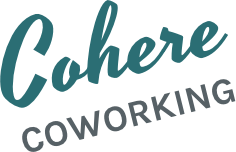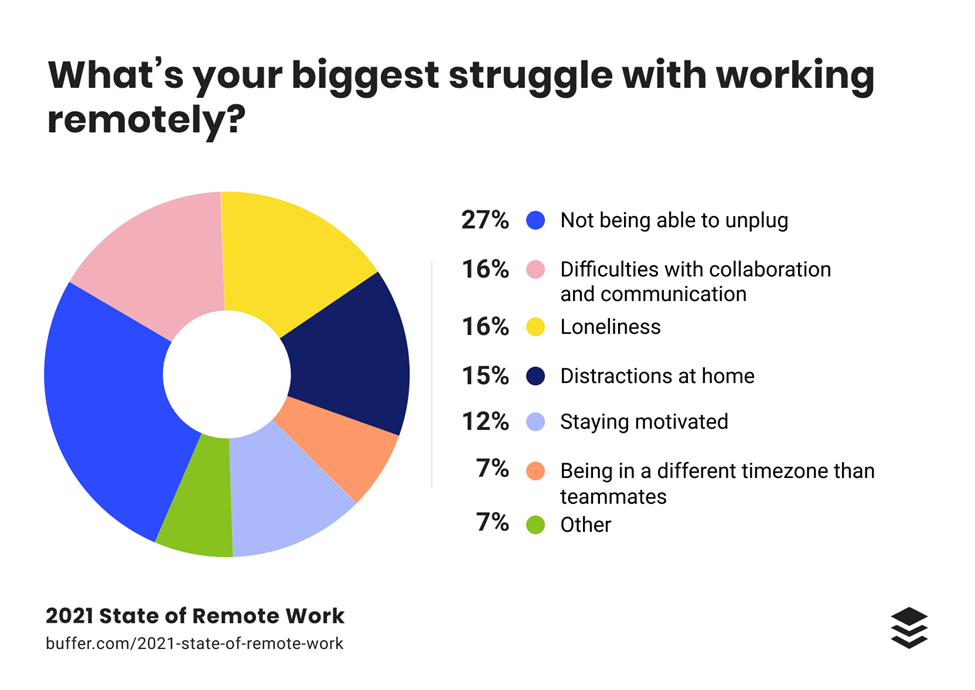
The new 2021 State of Remote Work was released recently, with some significant differences compared to the prior years’ reports. This year, nearly half of those responding to the survey were pushed to work remotely due to Covid-19—a change in dynamics from previous years.
Satisfaction rates from 2020 to 2021 remained surprisingly stable, despite the move to remote work being involuntary for a large portion of the workers surveyed. In 2021, 97.6% replied that they preferred working remotely, at least part of the time, for the rest of their careers—a minuscule drop from 98% the year prior.
While the biggest benefits of remote work also remained largely the same, changing by just a percent or two here and there, there was a significant shift reported around the biggest struggles. Prior to the pandemic, loneliness and difficulties with collaboration and communication topped the list of struggles, each recorded as the biggest struggle for 20% of remote workers.
After the pandemic, not being able to unplug was reported as the biggest challenge by more than a quarter of those surveyed, up from 18% in 2020. Remote workers who are unable to find time to unplug may be at higher risk of burnout and depression than their counterparts who allow themselves adequate downtime.
Implement Boundaries
Creating boundaries between work and home life helps to ensure that the stress from our workday doesn’t bleed into our time at home. There are several ways to establish healthy boundaries, including:
Physical Boundaries
While some individuals are lucky enough to have a room in their home that they can use as a dedicated workspace, not all of us have that luxury. Trying to work from your couch with the television running in the background isn’t exactly conducive to productivity, however. Setting up a dedicated workspace, even if it’s just in the corner of the kitchen, will help you better separate from work at the end of the day.
Technology Boundaries
Whether you set tech-free blocks time on your calendar or designate a specific area in your home tech-free, taking the time to unplug from technology will help you to refresh your mind and look at the world with a new perspective. Unplugging from technology is so crucial that in 2010 a National Day of Unplugging was declared during the first weekend in March.
Communication Boundaries
One of the best ways to muddle the line between work and home is to immediately answer each message as they come in. Instead, clearly communicate your work schedule to the people that you interact with, so they know when to expect a response, and when not to. Some people even go the extra step to block all work-related notifications during non-working hours.
Create rituals
Long commutes have generally been considered awful things. They aren’t typically productive, they use up precious extra time, and they increase pollution rates across the world. In fact, 22% of remote workers consider not having to commute as the biggest benefit to working remotely.
One thing about that daily commute was rather useful, however. It created an obvious line between the world of work and the world of home. Some may find it invigorating to take a walk or run outside prior to starting and ending each day, while others may find their daily serenity in reading an entertaining book, creating the next day’s to-do list, or listening to a specific song at the end of each day.
Out of sight, out of mind
Tidying up your area at the end of the day and placing work notes and equipment out of view will help to prevent work worries from intruding on the rest of your day. This is also a great time to silence any notifications you don’t want to receive and block any sites or apps that may tempt you to plug back in before you are ready.
Pursue play
Sometimes, we get so caught up in the day-to-day grind that we can forget how important it is to have fun, just for fun’s sake. Here are a few ways to pursue play here in Colorful Colorado.
Get active
Exercise doesn’t just improve your physical health, it improves your mental health as well. According to a study published in 2015, a 30-minute walk in the afternoon not only helped to battle the mid-day slump but also reduced the need for another cup of coffee.
*If you don’t already have a favorite place to walk or run in Fort Collins, here’s a handy link to the city parks and trails.
Invest time in a hobby
Engaging in a hobby or passion project regularly will help you to unplug from your work routine and enjoy your downtime more thoroughly. For those who haven’t yet found a passion outside of their work, there are a variety of free courses online both locally and nationally to try until you find a hobby that delights you.
Connect with others
Humans are typically social creatures, driven to connect with one another, but this can be a challenge when working remotely. Allow yourself time to interact with other humans in a non-work setting, whether in-person, on Slack, or on Zoom.
Looking to interact with other human beings, but not quite ready to leave your sanctuary? Check out Cohere’s virtual membership options and sign up for a virtual tour today!
Whether video chatting with work contacts a few states over, designing complicated spreadsheets, or managing social media accounts, remote workers often spend a great deal of time with their eyes glued to one screen or another. Combine that with balancing multiple schedules and a lack of clear boundaries, and it can become very difficult to unplug from work. These ideas will help you to embrace your off time, encouraging you to be a productive and positive person.
If you missed the last installment, click here to learn how remote workers in Northern Colorado can combat loneliness, or click here to start the series from the beginning!
Sign up for a virtual or in-person tour of Cohere Coworking today in Old Town Fort Collins. We can’t wait to meet you!
About the Author: Cohere member Penny Leigh Sebring is an experienced freelance writer, neophyte speculative fiction author, and a gatherer of information and imaginary friends.
Photo by Alisha Hieb on Unsplash

